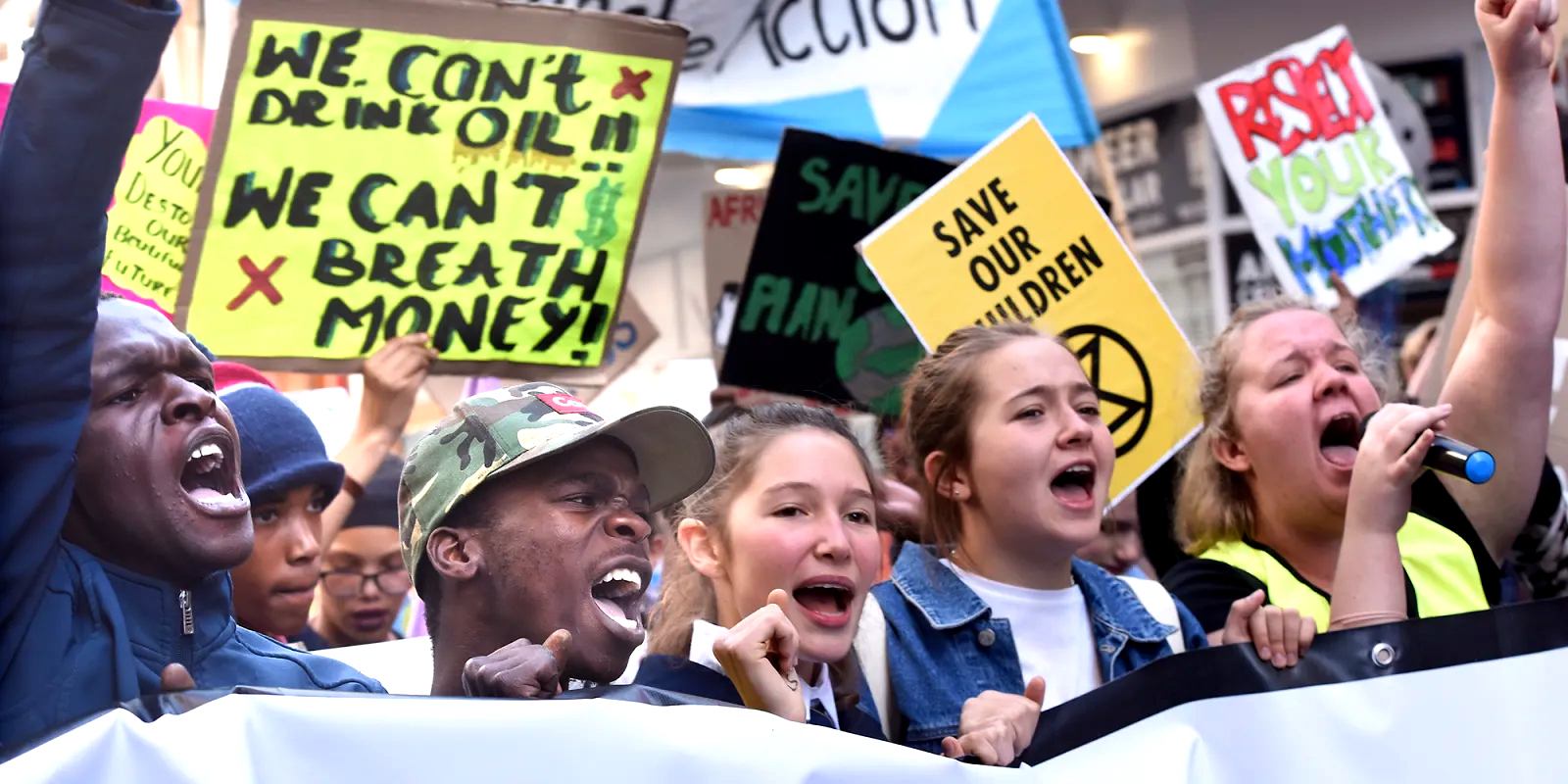GLOBAL STOCKTAKE
‘Humanity has opened the gates to hell,’ says UN chief after major report issues climate crisis warning

The world is not on track to meet the long-term goals set out in the Paris Agreement for limiting global temperature rise, a new report by the United Nations Framework Convention on Climate Change has warned.
In a pivotal step toward confronting the climate crisis, the United Nations Framework Convention on Climate Change (UNFCCC) has released its highly-anticipated Synthesis Report on the Technical Dialogue of the first Global Stocktake.
The first Global Stocktake, an integral component of the Paris Agreement, is a critical mechanism for evaluating the world’s progress in mitigating climate change and adapting to its impacts.
Article 14 of the Paris Agreement states: “The Conference of the Parties serving as the meeting of the Parties to this Agreement shall periodically take stock of the implementation of this Agreement to assess the collective progress towards achieving the purpose of this Agreement and its long-term goals (referred to as the ‘global stocktake’).”
The first of these stocktakes is meant to conclude at COP28 in Dubai later this year and then every five years thereafter.

Hundreds of schoolchildren march from Parliament in Cape Town to the city hall during the Youth Climate March on 14 June 2019. (Photo: Gallo Images / Brenton Geach)
Among the report’s more startling key findings is that, “Global emissions are not in line with modelled global mitigation pathways consistent with the temperature goal of the Paris Agreement, and there is a rapidly narrowing window to raise ambition and implement existing commitments in order to limit warming to 1.5 °C above pre-industrial levels.”
It expands on this, noting that in 2015 at COP21 in Paris, parties to the UNFCCC agreed “to aim to reach global peaking of greenhouse gas (GHG) emissions as soon as possible, recognizing that peaking will take longer for developing country Parties. According to the Intergovernmental Panel on Climate Change (IPCC) AR6, global GHG emissions need to peak between 2020 and 2025 to limit warming to the Paris Agreement temperature goal.
“Emissions have peaked in developed and some developing countries, but global emissions have not yet peaked. All Parties need to undertake rapid and deep reductions in GHG emissions in the decades after peaking.”
Read more in Daily Maverick: AR6 synthesis report: Warming above 1.5℃ is likely in the near term unless the world acts now, says the UN
Put differently, the world has not done enough to reduce the planet-warming greenhouse gases that have built up in the atmosphere and are — beyond 1.5 °C above pre-industrial levels — calculated to cause dangerous climate change.
‘The gates to hell’
All over the world, the signs of this failure are increasingly visible.
Making reference to this reality in his address before the United Nations General Assembly (Unga), US President Joe Biden said of the accelerating climate crisis, “We see it everywhere: record-breaking heatwaves in the United States and China; wildfires ravaging North America and Southern Europe; a fifth year of drought in the Horn of Africa; tragic, tragic flooding in Libya — my heart goes out to the people of Libya — that has killed thousands — thousands of people. Together, these snapshots tell an urgent story of what awaits us if we fail to reduce our dependence on fossil fuels and begin to climate-proof the world.”
Also at the Unga, President Cyril Ramaphosa said, “Africa is warming faster than the rest of the world. We are told that of the 20 climate hotspots in the world, 17 are in Africa.
“Centuries after the end of the slave trade, decades after the end of the colonial exploitation of Africa’s resources, the people of our continent are once again bearing the cost of the industrialisation and development of the wealthy nations of the world. This is a price that the people of Africa are no longer prepared to pay.
“We urge global leaders to accelerate global decarbonisation while pursuing equality and shared prosperity. We need to advance all three pillars of the Paris Agreement — mitigation, adaptation and support — with equal ambition and urgency.”
Speaking at a summit alongside the Unga on Wednesday, UN Secretary-General António Guterres said, “Humanity has opened the gates to hell. Horrendous heat is having horrendous effects. Distraught farmers watching crops carried away by floods; Sweltering temperatures spawning disease; and thousands fleeing in fear as historic fires rage. Climate action is dwarfed by the scale of the challenge. If nothing changes we are heading towards a 2.8 degree temperature rise — towards a dangerous and unstable world.”
Read more in Daily Maverick: The need for action on the climate crisis is more urgent than previously assessed – IPCC
‘Future is not fixed’
The UN boss also added, however, that “the future is not fixed” and that the target of limiting temperature rise as close as possible to 1.5°C is still attainable, saying, “We can still build a world of clear air, green jobs, and affordable clean power for all.”
These statements are reflected in the Synthesis Report. Some of its other key findings include:
- Since its adoption, the Paris Agreement has driven near-universal climate action by setting goals and sending signals to the world regarding the urgency of responding to the climate crisis. While action is proceeding, much more is needed now on all fronts.
- To strengthen the global response to the threat of climate change in the context of sustainable development and efforts to eradicate poverty, governments need to support systems transformations that mainstream climate resilience and low GHG emissions development.
- Much more ambition in action and support is needed in implementing domestic mitigation measures and setting more ambitious targets in Nationally Determined Contributions (NDCs) to realise existing and emerging opportunities across contexts, to reduce global GHG emissions by 43% by 2030 and further by 60% by 2035 compared with 2019 levels and reach net zero CO2 emissions by 2050 globally.
- Achieving net zero CO2 and GHG emissions requires systems transformations across all sectors and contexts, including scaling up renewable energy while phasing out all unabated fossil fuels, ending deforestation, reducing non-CO2 emissions and implementing both supply- and demand-side measures.
- As climate change threatens all countries, communities and people around the world, increased adaptation action as well as enhanced efforts to avert, minimise and address loss and damage are urgently needed to reduce and respond to increasing impacts, particularly for those who are least prepared for change and least able to recover from disasters.
- It is essential to unlock and redeploy trillions of dollars to meet global investment needs, including by rapidly shifting finance flows globally to support a pathway towards low GHG emissions and climate-resilient development.
- Existing cleaner technologies need to be rapidly deployed, together with accelerated innovation, development and transfer of new technologies, to support the needs of developing countries.
In a written response to the publication of the Synthesis Report of the Technical Dialogue of the first Global Stocktake, COP28 President Designate Dr Sultan Al Jaber said, “To keep 1.5 within reach we must act with ambition and urgency to reduce emissions by 43% by 2030.
“I am calling on leaders from both the public and private sector to come to COP28 with real and actionable commitments to address climate change.
“We need to rapidly decarbonise both the supply side and demand side of the energy system at the same time. We need to triple renewable energy by 2030, commercialise other zero-carbon solutions like hydrogen and scale up the energy system free of all unabated fossil fuels, while we eliminate the emissions of the energies we use today.
“We need to protect and enhance nature, safeguard carbon sinks and transform food systems that account for one-third of emissions and we need fundamental reform of the international financial architecture that was built for the last century,” said Al Jaber, who is also the United Arab Emirates minister of industry and advanced technology.
“I believe we can deliver all of this while creating sustainable economic growth for our people, but we must urgently disrupt business as usual and unite like never before to move from ambition to action and from rhetoric to real results.”
The end of the Global Stocktake process will occur at COP28 in Dubai at the end of the year. The process and its findings offer a crucial opportunity to correct course and accelerate climate action. With less than a decade to change course, there are not many chances left. DM





















Not humanity,certain leaders and tycoons in mining and poisons,cause they love MONEY
For sure. And backed up on DM by a bunch of oil-and-gas trolls it seems. I often wonder what their pay-by-word rate is these days?!
“Developed world emissions have peaked”, really? Not if you count the emissions from the manufacturing of goods imported into the developed world.
If one accepts that increasing CO2 emissions by humans warm the climate and thus reversing the process will cool the planet, I hope your letters to Santa get to him on time!